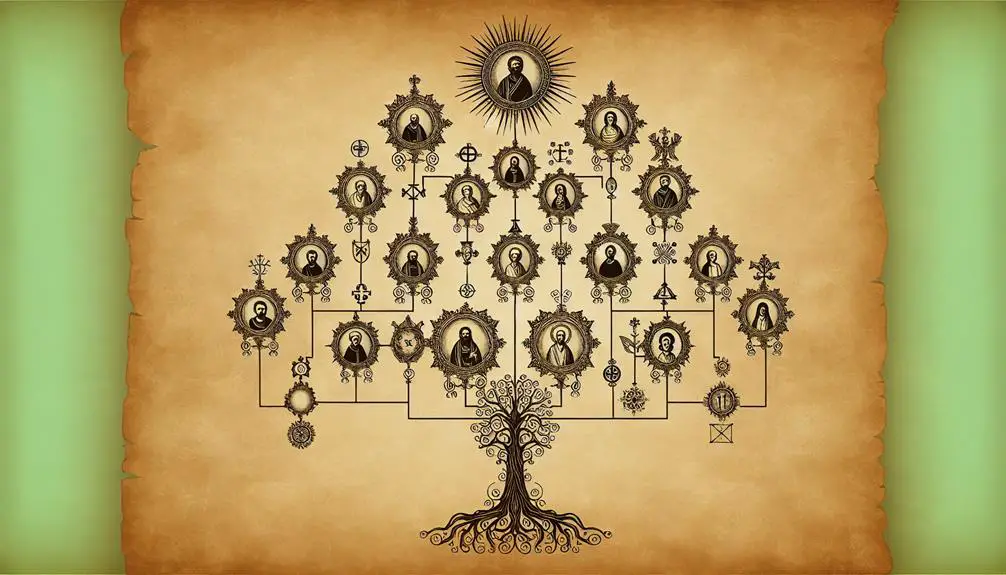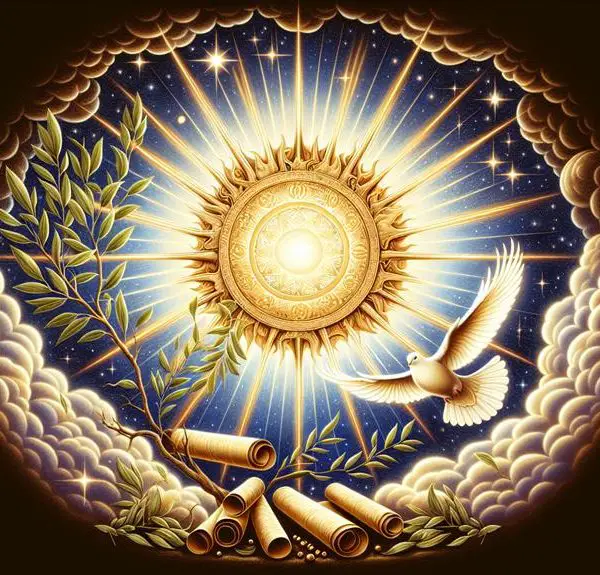Numerical symbolism in the Bible reveals the profound layers of meaning behind the number 17, hinting at divine mysteries waiting to be uncovered.
Significance of the Number 17 in the Bible
The significance of the number 17 in biblical texts is both profound and multifaceted, reflecting a complex tapestry of spiritual victory, resurrection, and divine order. This peculiar numeral surfaces in various contexts, from the meticulous genealogies of the Old Testament to pivotal moments of renewal and prophecy.
For instance, the intriguing narrative of Genesis positions 17 at the heart of Joseph's journey, symbolizing a transition from trials to triumph. Moreover, the number's appearance in relation to the resurrection suggests layers of meaning that extend beyond mere coincidence. Exploring these instances offers insight into the intricate ways numerology interweaves with theology, inviting a deeper contemplation of scripture's inherent patterns and themes.
Key Takeaways
- Number 17 in the Bible symbolizes triumph and resurrection, reflecting divine victory through faith.
- It is linked to significant biblical narratives like Joseph's story and the Battle of Jericho, emphasizing spiritual victory.
- The number signifies renewal and the promise of eternal life, particularly highlighted in Jesus' resurrection day.
- Number 17 embodies divine intervention and cosmic balance, showcasing the meticulous design of divine wisdom in biblical texts.
Biblical Occurrences of 17

The number 17 emerges in various biblical narratives, symbolizing both triumph and resurrection, thereby holding a multifaceted significance within the scriptural context. This numeral is not merely a figure but a bearer of profound theological meanings that transcend its surface value. It serves as a testament to the intricate tapestry of themes and motifs that the Bible weaves, touching upon the divine orchestration of events and the ultimate fulfillment of God's promises.
A notable instance wherein the number 17 is prominently featured is in the story of Joseph, a figure whose life journey from being sold into slavery to becoming a ruler in Egypt encapsulates themes of redemption and divine providence. It is at the age of 17 that Joseph experiences his prophetic dreams, which sow the seeds for his future trials and triumphs. This pivotal moment not only sets the course for Joseph's personal narrative but also foreshadows the salvation of his family and, by extension, the formation of the nation of Israel. The number 17, in this context, represents the inception of a divine plan, marked by dreams that would lead to unexpected victory and prosperity.
Similarly, the Battle of Jericho, another critical event in biblical history, is underscored by the number 17, albeit in a more implicit manner. The battle, culminating in a miraculous victory on the seventh day, following a sequence of seven days of marching, reflects a completion of a cycle and the fulfillment of divine will. This narrative, while not directly mentioning the number 17, resonates with its symbolic essence of overcoming insurmountable odds and emerging triumphant through faith and obedience to God's commands.
In these narratives, the number 17 thus serves as a beacon of hope, signifying that even in the darkest of times, faith can lead to miraculous deliverance and restoration.
Symbolism in Genesis

The symbolism embedded within the Book of Genesis, particularly in relation to the number 17, underscores profound theological and cosmological concepts.
The narrative elements such as Creation's Divine Order, the Covenant with Noah, and the Tree of Knowledge, serve not only as foundational mythos but also as vehicles for deeper spiritual and moral teachings.
These symbols, intricately linked with the number 17, invite a reflective examination of their significance within the broader tapestry of biblical theology.
Creation's Divine Order
In the book of Genesis, creation's divine order is meticulously outlined, serving as a foundational symbol for understanding the intricate relationship between God, humanity, and the cosmos.
This narrative is not only a recount of the origins but also an embodiment of divine wisdom through mathematical patterns and cosmic balance. The sequence of creation, culminating in the Sabbath, illustrates a harmonious design where numbers and their meanings play a crucial role.
Such mathematical patterns are not arbitrary; they reflect a deeper, intentional orchestration of life and existence, emphasizing the significance of balance, rhythm, and order in the universe.
Through this lens, Genesis invites reflection on the interconnectedness of all things under divine governance, underscoring the profound coherence and purposeful arrangement of creation.
Covenant With Noah
Reflecting on the profound coherence and purposeful arrangement of creation, the Covenant with Noah in Genesis symbolizes a pivotal moment in divine-human relationships, marking a renewal of the world through a promise sealed with a universal sign.
This narrative is not merely an account of survival but a testament to divine mercy and faithfulness, encapsulated in the rainbow promise—a symbol of God's enduring covenant with humanity and all living creatures.
The deliberate preservation of animal pairs aboard the ark underscores the intentionality of maintaining life's diversity, highlighting the interconnectedness and sacredness of all creation.
This story, rich in symbolism, invites a reflective consideration of divine promises and the responsibility of stewardship entrusted to humanity, reinforcing the covenant's significance as a foundational element in the collective memory and spiritual identity of the faithful.
Tree of Knowledge
Central to the narrative of Genesis, the Tree of Knowledge represents a profound symbol of moral and spiritual awakening, signifying the transition from innocence to the awareness of good and evil within the human experience. This pivotal moment in biblical lore encapsulates humanity's perpetual Wisdom pursuit, underscored by the consequential act of partaking in the Forbidden fruit.
- The Tree of Knowledge serves as a catalyst for mankind's journey into moral complexity.
- Eating the Forbidden fruit symbolizes the irreversible step from naivety to enlightenment.
- This act initiates the profound dichotomy of sin and virtue within human consciousness.
- The narrative underscores the inherent human desire for wisdom, despite the potential for downfall.
Analytically, the Tree of Knowledge stands as a testament to the complex interplay between innocence and culpability in the quest for understanding.
17 and Spiritual Victory

While the number 17 may not be universally recognized for its significance, within the biblical context, it symbolizes spiritual victory and the overcoming of obstacles through faith. This resonance can be understood when examining the broader narrative arcs of the Bible, where the principles of victory celebration and spiritual warfare are deeply intertwined. The number 17, thus, does not merely represent a chronological marker but embodies a deeper, spiritual triumph over adversities.
In biblical numerology, numbers often carry symbolic meanings that transcend their literal sense. The occurrence of 17 in contexts of deliverance and divine victory points to a pattern of spiritual warfare wherein faith, perseverance, and divine intervention culminate in the overcoming of spiritual battles. This culminates in a victory celebration that is not just a momentary joy but a testament to enduring faith and the power of divine will.
Analyzing the scriptural narratives, one notes that victories in spiritual warfare are often preceded by significant challenges, where the protagonists' faith is tested to its limits. The emergence of the number 17 in these contexts suggests a divinely ordained moment of breakthrough and liberation. It is a symbolic reminder that spiritual victory is achieved not by human might but through steadfast faith and divine intervention.
In reflection, the significance of the number 17 transcends its numerical value, encapsulating a profound spiritual truth. It serves as a beacon of hope and a reminder that victory over spiritual adversities is attainable, marking not just an end but a divine affirmation of faith, perseverance, and spiritual resilience.
Resurrection and Renewal

In biblical numerology, the number 17 often symbolizes resurrection and renewal, themes that are deeply embedded in the narrative of Jesus' resurrection day.
This pivotal event not only underscores the triumph over death but also marks a profound moment of spiritual renewal, offering a new paradigm for understanding life, death, and rebirth.
The exploration of these themes within the biblical context provides a rich tapestry for theological reflection, inviting scholars and believers alike to consider the transformative power of resurrection and the promise of renewal.
Jesus' Resurrection Day
One of the most pivotal events in Christian theology, Jesus' Resurrection Day, embodies the concepts of resurrection and renewal, marking a cornerstone of faith and the promise of eternal life. This day, widely known as Resurrection Sunday, is celebrated with various Easter traditions that reflect the profound impact of this event on Christian doctrine and practice. The significance of this day extends beyond mere historical commemoration, offering a rich tapestry for theological exploration and spiritual reflection.
- Easter traditions serve as a reminder of the victory over death and the hope of new beginnings.
- Resurrection Sunday underscores the foundational Christian belief in life after death.
- The event invites an analytical exploration of faith's role in personal and collective renewal.
- It stands as a reflective point for understanding the intertwining of historical events and spiritual truths.
Renewal Themes Explored
The theme of renewal, deeply intertwined with the concept of resurrection, offers a rich vein of theological and philosophical inquiry within Christian thought. This narrative is not only pivotal for understanding the transformative journey of the soul but also serves as a metaphor for personal growth and rebirth in the mundane aspects of human life.
The biblical accounts of resurrection and renewal, especially as symbolized by the number 17, find modern parallels in stories of recovery, reinvention, and spiritual awakening. These narratives, both ancient and contemporary, underscore the perpetual possibility of transcending former limitations and emerging renewed.
Thus, the biblical motif of renewal invites reflection on the cycles of death and rebirth, both in a spiritual and a personal growth context, offering a timeless framework for understanding the dynamics of human transformation.
17 in Prophetic Contexts

Frequently, the number 17 emerges within prophetic contexts in the Bible, serving as a symbol with profound theological implications. Its occurrence is not merely coincidental but deeply woven into the fabric of biblical prophecy, underscoring the complexities of divine communication through numbers. This nuanced appearance of 17 in contexts of prophecy speaks volumes about its significance, particularly when connected to end times prophecy and prophetic dreams, areas rich with symbolism and forewarning.
- Interpreting Prophetic Dreams: Joseph's life, as narrated in Genesis, is punctuated with dreams that have prophetic implications, embodying the essence of divine messages. The number 17 represents the age at which Joseph was sold into slavery, marking the beginning of a journey filled with prophetic dreams and their fulfillment.
- End Times Prophecy: Revelations, though not directly mentioning the number 17, is a book dense with numbers holding prophetic relevance. Scholars often draw parallels between the numeric symbols in Revelations and the underlying themes of judgment and redemption, where 17 could symbolically fit into the broader narrative of renewal and completion.
- Symbolic Representation: In prophetic literature, numbers often transcend their literal meanings to convey deeper theological truths, with 17 symbolizing victory and resurrection, themes prevalent in eschatological prophecies.
- Numerical Patterns: The Bible's prophetic texts frequently employ numerical patterns to emphasize God's sovereignty and the fulfillment of His divine plan, with 17 playing a role in illustrating the meticulous design of prophecy.
The exploration of number 17 within prophetic contexts enriches our understanding of biblical numerology and its intricate connection to the divine narrative, offering a unique lens through which to interpret the prophetic messages embedded within the sacred texts.
The Flood Narrative

In exploring the biblical account of the Flood, as narrated in Genesis, the number 17 emerges as a pivotal element, marking a significant moment in this foundational narrative. This detail is not merely incidental but carries with it layers of symbolic import that merit closer examination. The narrative meticulously records that on the 17th day of the second month, the fountains of the great deep burst forth, and the floodgates of the heavens were opened, setting the stage for a divine intervention that would reshape the very fabric of creation.
The use of the number 17 here is reflective, inviting readers to delve deeper into its significance within the broader tapestry of biblical symbolism. This number symbolizes victory, as it marks the day when the cleansing process began, leading to a new creation. Furthermore, the eventual subsiding of the waters and the emergence of dry land on the 17th day of the seventh month encapsulate a narrative of renewal and restoration. This cyclical journey from judgment to salvation is emblematic of the divine promise of restoration, vividly symbolized by the rainbow promise given to Noah, signifying a covenant of peace between God and all living creatures.
The deliberate pairing of animals aboard the ark further underscores themes of preservation and continuity amidst cataclysmic change. These animal pairs, saved from the deluge, symbolize the preservation of life and biodiversity, entrusted to Noah's care. This aspect of the narrative foregrounds the interdependence of all creation and the responsibility bestowed upon humanity to steward it. The Flood narrative, with the number 17 as a cornerstone, thus encapsulates themes of judgment, renewal, and covenant, offering profound insights into the nature of divine providence and the human condition.
Genealogy of Jesus

Exploring further into the intricate tapestry of biblical narratives, the genealogy of Jesus emerges as a profound testament to the interweaving of divine purpose and human history. The Gospel according to Matthew meticulously outlines the Messiah's lineage, tracing it back to Abraham, thereby affirming Jesus' rightful place within the Jewish heritage and fulfilling Old Testament prophecies. This lineage is not merely a historical record but a declaration of Jesus' royal bloodline, underscoring his identity as both the anticipated Jewish Messiah and the eternal King.
Key aspects of Jesus' genealogy that capture its significance include:
- Fulfillment of Prophecy: The genealogy underscores how Jesus' birth aligns with ancient predictions about the Messiah's lineage.
- Royal Bloodline: It traces Jesus' descent from King David, highlighting the royal heritage essential for the Messiah's identity.
- Inclusion of Gentiles and Women: Remarkably, the genealogy includes Gentiles and women, signaling the universal scope of Jesus' mission.
- Symbolism and Structure: The structured genealogy mirrors divine order, hinting at deeper layers of meaning and purpose behind the Messiah's arrival.
The genealogy of Jesus serves not only as a historical account but also as a profound statement of God's intentional planning throughout generations. By weaving together the threads of prophecy, royal descent, and inclusivity, the genealogy of Jesus presents a compelling picture of divine precision and the universal reach of salvation. This lineage, meticulously preserved and presented, invites reflection on the broader narrative of redemption and God's unwavering commitment to humanity.
Numerology and Divine Order

Numerology, a key aspect of biblical interpretation, unveils the intricate layers of divine order and significance encoded within the Scriptures. This analytical exploration into the realm of numbers found in the Bible reveals not just the surface meanings but delves into the profound depths where numerical patterns serve as conduits of divine messages. The study of these patterns transcends mere coincidence, suggesting a deliberate design that reflects the meticulous nature of the divine blueprint.
In the context of biblical numerology, each number holds a unique essence and message, believed to be inspired by the divine to guide, teach, and reveal truths to humanity. The number 17, for instance, emerges within the scriptural narrative as a symbol of victory and resurrection, pointing to the overarching themes of redemption and divine intervention. Such numerical symbols are not arbitrary but are interwoven with the theological and cosmological views of the biblical authors, reflecting a universe infused with divine order and meaning.
The consideration of angelic messages further enriches our understanding of biblical numerology. Angels, as messengers of God, often communicate through numbers, providing a celestial link between the divine and the human. This connection emphasizes the belief in a cosmos where divine messages permeate the fabric of reality, accessible through the meditative and reflective study of numerical patterns within the Scriptures. Thus, numerology serves as a bridge to understanding the deeper angelic messages that underscore the divine order, offering insights into the spiritual dimensions that govern the universe.
Frequently Asked Questions
How Has the Interpretation of the Number 17 Evolved in Christian Tradition Outside of the Biblical Text Itself?
In Christian tradition, the interpretation of the number 17 has evolved through the lenses of numerology study and cultural symbolism. This evolution reflects a scholarly inquiry into its implications outside the biblical narrative.
The analytical exploration of 17's significance has led to a reflective understanding of its role in various Christian contexts, enriching the tradition with a deeper, symbolic meaning that transcends its original biblical associations.
This progression showcases the dynamic nature of numerical symbolism in religious thought.
Are There Any Significant Differences in How the Number 17 Is Viewed or Interpreted Among Various Christian Denominations?
The interpretation of numerical symbolism, including the number 17, varies among Christian denominations, reflecting diverse theological views and scriptural understandings.
Denominational perspectives play a pivotal role in shaping the significance attributed to numbers, with some traditions emphasizing mystical or prophetic meanings more heavily than others.
This diversity underscores the complexity of biblical exegesis and the rich tapestry of beliefs within Christianity, highlighting the importance of context in theological interpretation.
How Do Non-Christian Religions or Philosophical Traditions View or Interpret the Significance of the Number 17, if at All?
In the realm of numerology and cultural perspectives, the number 17 often holds varied significance across non-Christian religions and philosophical traditions. This digit symbolizes a tapestry of meanings, woven from the threads of ancient traditions and contemporary interpretations.
Scholars reflect on its symbolism, uncovering layers that transcend mere numerical value. Analytically, its importance is assessed within diverse contexts, revealing a fascinating intersection of belief systems and the universal search for meaning in numbers.
Can the Significance of the Number 17 Be Traced in Early Christian Art or Architecture, and if So, in What Contexts or Examples?
The exploration of numerical symbolism within early Christian art and architecture reveals a nuanced engagement with numbers, including the number 17.
This inquiry, grounded in an analytical and scholarly approach, delves into instances where the numerical value informs artistic representation, reflecting theological or cosmological concepts.
While direct examples are scarce, the broader context of numerological interpretation in early Christian works suggests a layered, reflective engagement with such symbols, albeit in less overt forms.
Has Modern Biblical Scholarship Challenged or Provided New Insights Into the Significance of the Number 17 in the Bible Compared to Traditional Interpretations?
Modern biblical scholarship has indeed reevaluated the significance of the number 17, juxtaposing traditional beliefs with contemporary numerology analysis. This fresh scrutiny has not only affirmed some longstanding symbolic interpretations but also introduced novel insights.
Through an analytical and scholarly lens, researchers delve into the layers of biblical text, uncovering nuanced meanings that reflect both historical contexts and evolving theological perspectives, thereby enriching our understanding of biblical numerology.
Conclusion
In conclusion, the number 17 in biblical literature emerges not merely as a numeral but as a multifaceted symbol woven into narratives with theological finesse. It serves as a testament to the intricate design underlying sacred texts, where numbers transcend mere markers of quantity to embody themes of resurrection, victory, and divine order.
This exploration peels back layers of scriptural numerology, revealing a divine comedy where numbers choreograph a dance of deep spiritual significance, inviting readers to look beyond the surface and ponder the profound.



Sign up